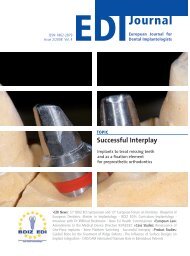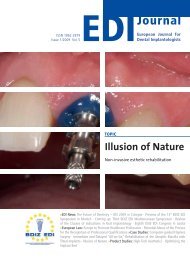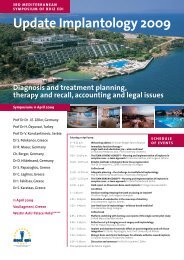EDI - European Association of Dental Implantologists
EDI - European Association of Dental Implantologists
EDI - European Association of Dental Implantologists
Create successful ePaper yourself
Turn your PDF publications into a flip-book with our unique Google optimized e-Paper software.
46<br />
<strong>EDI</strong><br />
<strong>EDI</strong> News<br />
<strong>European</strong> Commission to strengthen patients’ rights<br />
Are we Threatened by<br />
a New Wave <strong>of</strong> Regulations?<br />
Peter Knüpper, solicitor, Munich/Germany<br />
The <strong>European</strong> Court <strong>of</strong> Justice (ECJ) has passed an<br />
extensive body <strong>of</strong> legal decisions on this topic since<br />
1998. In summary, the court has stated that healthcare<br />
services are covered by the freedom to render<br />
services, which is one <strong>of</strong> the four <strong>European</strong> fundamental<br />
freedoms. The free movement <strong>of</strong> goods, persons,<br />
capital and, not least, services have long been<br />
taken for granted by most <strong>of</strong> us. Nevertheless, only<br />
30 percent <strong>of</strong> all EU citizens know that they can<br />
choose to obtain health services in other EU countries,<br />
where the social security system in the patient’s<br />
home country – whether run directly by the state or<br />
in the form <strong>of</strong> an insurance system – has to reimburse<br />
the patient if those services would have been<br />
<strong>of</strong>fered or reimbursed for in the home country.<br />
No prior authorization required<br />
for outpatient services<br />
This is exactly what the draft Directive codifies, with<br />
the result that EU citizens will no longer have to<br />
approach the ECJ in Luxembourg in order to obtain<br />
reimbursement but can confront their national<br />
administrations or health insurance institutions<br />
directly with the new Directive on patients’ rights. It<br />
states, in unison with ECJ decisions, that outpatient<br />
services do not require prior authorization. The same<br />
is true <strong>of</strong> inpatient health services that require a<br />
patient to be admitted overnight or that are included<br />
on a list <strong>of</strong> specific diseases – unless “the financial<br />
balance <strong>of</strong> the Social Security system” were threat-<br />
The <strong>European</strong> Commission finally presented its proposal for a Directive to facilitate the application<br />
<strong>of</strong> <strong>European</strong> patients' rights in relation to cross-border healthcare on 2 July 2008, as part <strong>of</strong> its<br />
Renewed Social Agenda. The proposal is intended to respond to rapid changes in the social and eco-<br />
nomic fields. It intends to promote citizens’ “social well-being” through a mixture <strong>of</strong> measures and<br />
instruments while at the same time harmonizing and modernizing the existing political armamen-<br />
tarium. The proposed Directive covers cross-border health services that patients may obtain outside<br />
their home country – such as the hip joint surgery that a British patient had had performed in<br />
France, bypassing the long waiting lists <strong>of</strong> the British National Health Service.<br />
ened or the planning and rationalization carried out<br />
in the hospital sector were “seriously undermined”<br />
(Article 8 (3) <strong>of</strong> the draft guideline). The prior authorization<br />
system must be limited to what is necessary<br />
and proportionate to avoid such an impact and must<br />
not constitute a means <strong>of</strong> arbitrary discrimination.<br />
The Member States must act to improve the flow <strong>of</strong><br />
information concerning potential healthcare services<br />
in other EU Member States.<br />
The <strong>European</strong> Commission continues to uphold<br />
the sole responsibility <strong>of</strong> the Member States for the<br />
organization and delivery <strong>of</strong> health services and<br />
medical care. The Directive also demands <strong>of</strong> the<br />
Member States to respect the principles <strong>of</strong> universality,<br />
access to quality care, equity and solidarity and<br />
define observe clear standards for quality and safety<br />
and health care. They also have to ensure that “mechanisms<br />
are in place for ensuring that healthcare<br />
providers are able to meet such standards, taking<br />
into account international medical science and generally<br />
recognized good medical practices”. In addition,<br />
EU Member States are tasked to ensure that the<br />
application <strong>of</strong> such standards in practice is regularly<br />
monitored.<br />
National contact points<br />
Healthcare providers will have to “provide all relevant<br />
information to enable patients to make an informed<br />
choice, in particular on availability, prices and outcomes<br />
<strong>of</strong> the healthcare provided”. This also includes









